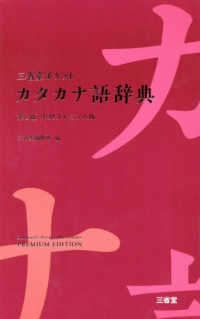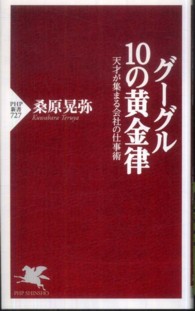Full Description
This volume offers a comprehensive view of current research directions in Translation and Interpreting Studies, outlining the theoretical concepts underpinning that research and presenting detailed discussions of the various methods used.
Organized around three factors that are responsible for shaping the study of translation and interpreting today—post-positivist theoretical approaches, developments in the language industry, and technological innovations—this volume is divided into three parts:
Part I introduces the basic concepts organizing translation and interpreting research, such as the difference between qualitative and quantitative research, between product-oriented and process-oriented studies, and between prescriptive and descriptive approaches.
Part II provides a theoretical mapping of current translation and interpreting research, covering the theories underlying the current conceptualization of translation and interpreting, from queer studies to cognitive science.
Part III explores the key methodological approaches to research in Translation and Interpreting Studies, including corpus-based, longitudinal, observational, and ethnographic studies, as well as survey and focus group-based studies.
The international range of contributors are all leading research experts who use the methodologies in their work. They present the research aims of these methods, offer sample research questions that can—and cannot—be addressed by these methods, and discuss modes of data collection and analysis. This is an essential reference for all advanced undergraduates, postgraduates, and researchers in Translation and Interpreting Studies.
Contents
Acknowledgements
Notes on Contributors
Introduction: Claudia V. Angelelli and Brian James Baer
Part I: Exploring Translation and Interpreting: Claudia V. Angelelli and Brian James Baer
Part II: Mapping the Field
Agency and Role: Sergey Tyulenev
Bilingualism and Multilingualism: Claudia Angelelli
Cognitive Processes: Erik Angelone, Maureen Ehrensberger-Dow, Gary Massey
Collaborative and Volunteer Translation and Interpreting: Miguel A. Jiménez-Crespo
Fictional Representations of Translators and Interpreters: Klaus Kaindl
Gender and Sexuality: Brian James Baer and Françoise Massardier-Kenney
History and Historiography: Maria Fernandez Sanchez
Pedagogy in Translation and Interpreting Education: Claudia Angelelli and Sonia Colina
Power and Conflict: Anna Strowe
Profession, Identity, and Status: Rakefet Sela-Sheffy
Reader Response/Reception Theory: Leo Tak-hung Chan
Part III: Research Methods
Action Research: Brenda Nicodemus and Laurie Swabey
Bibliometric Studies: Luc Van Doorslaer
Case Studies: Bernd Meyer
Conversational Analysis: Laura Gavioli
Corpus-based Studies: Leonard Giannossa
Critical Discourse Analysis: Ian Mason
Ethnography: Edmund Asare
Experimental Studies: Daniel Gile
Histoire Croisée: Michaela Wolf
Interviews and Focus Groups: Ursula Böser
Narrative Analysis: Mona Baker
Observations: Claudio Baraldi and Christopher D. Mellinger
Survey-based Studies: Sanjun Sun







